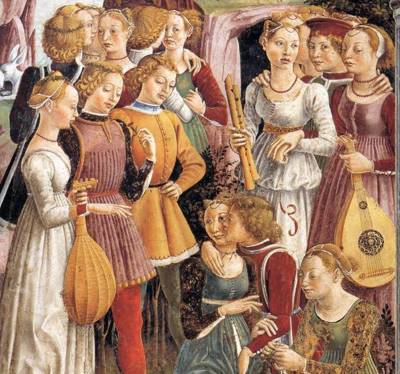This project includes a research roundtable and concert drawing on forthcoming research into little known Italian virtuosa, Leonora Bernardi.

- Lisa Sampson (UCL SELCS)
- Virginia Cox (University of Cambridge)
- Eugenio Refini (New York University),
- Laurie Stras (University of Southampton),
- Richard Wistreich (Royal College of Music)
- Christina Birchall-Sampson (musician)
- Tabitha Tuckett (musician, UCL).
About the project
This project will create a collaborative music and research event open to the public, involving academics and music professionals, which provides new insights into a hitherto almost unknown Italian virtuosa, Leonora Bernardi. It draws on research forthcoming with UCL Press: Drama, Poetry and Music in Late-Renaissance Italy: The Life and Works of Leonora Bernardi, a volume edited by Virginia Cox and Lisa Sampson, with a translation by Anna Wainwright and contributions by Eric Nicholson, Eugenio Refini and Davide Daolmi.
Leonora Bernardi (1559-1616) was celebrated in her time as a dramatist, poet and singer, but her colourful biography and works have only recently been recovered from Italian archives and early printed anthologies, as brought to light in the UCLP volume. These works consist of a full-length pastoral play (‘Clorilli’) with striking pro-feminist polemic, and a slim corpus of verse of which a notable proportion was set to music, including by leading composers of her time like Philippe de Monte and Giulio Caccini.
The roundtable will explore the broader significance of these new research findings on Bernardi’s life and works in the context of the rich musical-poetic and dramatic developments of the period in which she flourished. Bernardi’s activity coincides with experimentation into early forms of ‘sung drama’ (opera in musica) in aristocratic milieus and with the craze at courts for vocal consorts displaying virtuoso female voices for restricted audiences (musica secreta). The discussion will also position Bernardi’s work more generally against practices of ‘doing’ music in this period, which included innovative collaborations between poets, singers and musicians – male and female – and the development of new vocal techniques and musical styles.
The concert that follows will present Bernardi’s poetry and first performances of some of their musical settings, of which 13 have to date been identified. It will also feature music that evokes the soundscape of her life between the vibrant and culturally pioneering courts of the Este dynasty in Ferrara and the Medici in Florence, and in her hometown Lucca in the late sixteenth and early seventeenth centuries. The musical programme will include music by other female virtuose too, like Francesca Caccini. It will be devised collaboratively between academic researchers and the small ensemble of professional singers and musicians who will be performing. The musical settings of Bernardi’s poetry will draw on the transcriptions prepared for the UCLP volume by musicologist Davide Daolmi (Milan), and the study of Bernardi’s poetry in music by Eugenio Refini.
By considering Bernardi’s works in performance and through practice this event aims to add a new dimension to the extensive scholarly research already undertaken to document Bernardi’s life and to analyse her works as well as building on the experience of staging her pastoral play, directed by Eric Nicholson in 2018 (see here). For any woman from this period, documentation is sparse and fragmented, and it requires imaginative contextualization to fill in the gaps in the records. Existing evidence also has to be evaluated in light of contemporary views of the female sex and important existing studies on female virtuose and early modern performance. The consideration of Bernardi’s case will highlight the particular prejudices against women engaged more visibly in cultural activities and especially in performance, and explore artistic collaborations and rivalries. The event thereby aims to bring further insights into issues of gender in performance, and musical-poetic culture at a critical point when new dramatic forms like opera were being pioneered and male and female virtuosi and ‘professionals’ were coming to the fore.
Image source: accessed throughThe Web Gallery of Art via https://www.wga.hu/
 Close
Close

